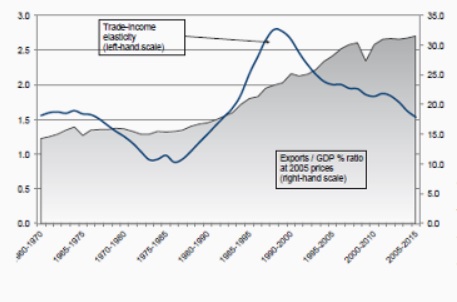Peak Globalization, A Solar Moore’s Law and Cheap Phones
This week at International Need to Know we light up your life with the exponential growth of solar energy, darken it with the decline in world trade and note where the cheapest and most expensive phone bills are in the world. Welcome to this week’s edition of International Need to Know, your global gift of information and data.
Of course, if you don’t want to know, just hit “unsubscribe” at the bottom or reply to this email and I’ll remove you from the list. Alternatively, if you want others to be in the know, hit “tell a friend” which can also be found at the bottom. Without further ado, here’s what you need to know.
Peak Globalization?
Since World War II, world trade has grown at a faster rate than world GDP. In fact, according toBernard Hoekman at the Robert Schuman Center, “Global trade increased 27-fold between 1950 and 2008, three times more than the growth in global GDP.” Global trade grew even faster than GDP during the period from the early 1980s to mid-2000s thanks in large part to China’s reintegration into the global economy and the fall of the Iron Curtain. But the world has changed the last ten years. Even before the financial crisis, trade growth has been below GDP growth. So, the trade to GDP ratio, after rising from 25% in the 1960s, is now stuck at 60% today and falling. Is this peak globalization? Probably not, globalization is more than trade, it’s investment, immigration, cultural transference and more. But, at least for the moment, world trade is not driving the economy. In fact, in a worrisome sign, world trade has been shrinking in recent months. More on that soon.

A Moore’s Law of Solar Power?
We alluded to this in last week’s INTN (the latest hip acronym—memorize it, use it)—solar power is increasing rapidly. In fact, the amount of solar generation is doubling every two years or so. The futurist Ray Kurzweil pointed this out in the late aughts and yours truly decided to track solar power and see if Kurzweil, to use a technical term, is full of it. Well, at least in this regard, Kurzweil is on track—the solar power increase phenomenon continues as you can see in the graph below from the International Energy Agency (IEA). As solar costs continue to decrease and as finally there are real strides in energy storage technology, it seems likely this exponential rate of growth will continue. If this doubling continues, then by the 2030s (not that far from now if you think about it—sure at current rates most rock gods will be dead, but Keith Richards is likely to still be alive), basically all our energy needs could come from solar generation and storage. This will have a profound impact on our economy, jobs, stock market and efforts to combat climate change. Something to keep in mind as that same mind reels from today’s falling oil prices, stock markets and rock idols.
Expensive Smart Phone Bills? Move to Iran
I’ve managed to use a question mark in every headline. Question marks are an under utilized punctuation in human discourse. To paraphrase the Atticus Finch of modern lawyers, Dean Strang, much of what ails us is certitude. At any rate, International Need to Know is amazed at his monthly smart phone bill. But, it could be worse, he could live in Tuvalu (for those not acquainted, it’s a Polynesian island nation and also would be a great lyric for a 1960s R&B song), which has the most expensive monthly phone usage costs. Or we could save some Rial and move to Iran, the third cheapest place to have a phone. For your travel and shopping pleasure we present the top ten cheapest and most expensive places for phones.




Trackbacks & Pingbacks
[…] reports that, “solar has been higher in 2024 for most countries reporting.” In one of our first International Need to Know posts way back in 2016, when we were all innocent children frolicking in an unfallen world, we pointed to someone who […]
[…] rate of growth as their average over the last decade.” We chronicled this exponential growth back in 2016 and it has stayed on this path the last six years. Can it sustain such growth for another eight? […]
[…] years ago, in one of our first missives in this space, we discussed how solar power was expanding exponentially and promised to see if that would still be the case in the coming years. It was January 21, 2016 to […]
Leave a Reply
Want to join the discussion?Feel free to contribute!